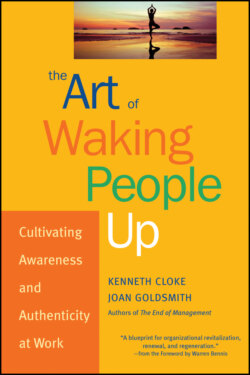Читать книгу The Art of Waking People Up - Kenneth Cloke - Страница 36
What Wakes Us Up
ОглавлениеWhat, then, can be done to release ourselves and others from the hypnotic trance in which we spend much of our working lives? In truth, anything can wake us up at any time: a casual comment, a chance occurrence, a moment of idle reflection. Most of us, however, are awakened with a start by events that shock us out of our complacency, or by an experience of pain or suffering. For example we may be awakened by
• A sudden awareness of death. When we receive a clear warning of our imminent demise, as when we suffer a heart attack, or learn we have cancer, or hear about a tragic loss to someone close to us, or are touched by a collective tragedy such as occurred on September 11, 2001, we may realize that we have not lived our lives as we wanted.
• A horrible humiliation. When we suffer shame or humiliation as a result of some action we took that lacked integrity, we may recognize that our blunder asks us to empathize with the suffering of others and act more humanely.
• A personal failure. When we fail, or are tempted to sell our souls for transitory successes, we may find it better to fall short and retain our integrity than succeed by methods that we know are self-destructive.
• A lover’s rejection. When someone we love leaves us and we feel rejected, we may learn that sadness and loss are not the end of loving, or that we gave our love to the wrong person, or that we were complicit in their departure, or that their leaving allows us to grow and explore new parts of ourselves, or that we can learn to be better partners in the future.
• A loss of employment. When we have been disciplined or fired from our jobs, we may find that we took the wrong job, or wonder why others were able to see it and we were not, or renew our determination to find work we love.
• An unresolved conflict. When we are angry and locked in conflict, we may suddenly realize that we have lost our capacity for balance and empathy and discover that beneath our conflict is a possibility of better communications, processes, relationships, and understandings.
Though waking up often produces pain, both for the one whose honest feedback encouraged awareness and the one who woke up after receiving it, this very pain can lead to a deeper and more profound pleasure. This pleasure arises partly from the realization that whoever initiated the process cared enough about us to risk our wrath or displeasure, and partly from the enhanced self-esteem we feel when we listen to their feedback and become more congruent and skillful in the ways we behave.
But it is not necessary to experience death, loss, or pain in order to wake up. We can also do so through an experience of joy or pleasure. For example:
• A moment of intense joy. When we fall in love or experience some exquisite pleasure, we are reminded that our experience of life is shaped by our attitude toward it, which can be full of pain or pleasure, fear or adventure, sadness or joy.
• A perception of beauty. When we experience nature or are touched by a poem or work of art, we may catch a glimpse of the exquisite underlying beauty that surrounds us.
• A deep meditation. When we meditate, we may become intensely aware of the impermanence of life and the inevitability of change and wake up to living in the present.
• A recognition of absurdity. When we recognize that what is important at work, on a cosmic level, seems futile and absurd, we may surrender to a larger truth and recognize that life and work do not have to have a purpose or make sense, but can be enjoyed and experienced more deeply when we don’t take them so seriously.
• A spectacular success. When we succeed or achieve an important goal or experience successive accomplishments, we may discover that it was not the destination but the journey that truly mattered.
• A gift of honest feedback. When someone gives us the gift of deeply honest feedback, we may discover that we have the ability to change the way we act and think and begin to live our lives more authentically, skillfully, and openly.
While these pleasures encourage awareness, every waking up is also accompanied by pain caused partly by the death of a false idea of who we are. Yet this very death gives rise to a new form of pleasure in the birth of a truer, more accurate and authentic way of life. Often the thing we hold onto with all our might out of fear of loss ends up being the very thing we most need to let go of if we want to live more fully and without fear. Awareness and letting go are thus entwined and inseparable.
